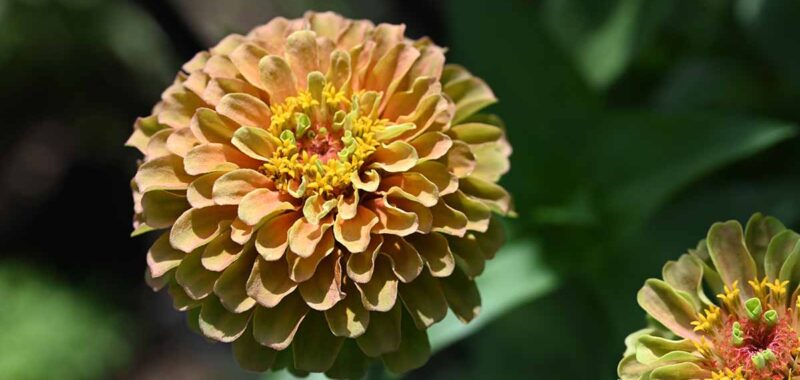Water
Queeny zinnia flowers require moderate water, if the top inch or two of soil is dry, add some moisture.


You can apply a layer of mulch to help retain moisture which will also suppress weeds.
Water at the soil level, not from overhead as excessive moisture on the foliage can lead to fungal infections.
Temperature
Queeny zinnias thrive in warm summer weather. They are happiest when the temperatures are between 70 and 90°F.


They’ll survive nightly dips into the 40s and 50s, but frost will kill the plants.
Fertilizing
As noted above, Queeny zinnias thrive in organically-rich soil so before you sow or transplant, work in some well-rotted compost.
If you added compost at planting time, there’s no need to fertilize, unless the plants aren’t blooming when they should be.
In this case, you can apply some bone meal which is high in phosphorus to promote flowering.


Down to Earth Bone Meal
You can pick up a box of bloom-boosting Down to Earth Bone Meal from Arbico Organics.
Cultivars to Select
In addition to the original pale green cultivar, there are several other options in the Queeny series to choose from as well.
Queeny Lime
With chartreuse blooms, this one used to be called Queen Lime, and is the cultivar that started the series.


The blooms are two to three inches wide, mostly semi- or fully double, and held on sturdy stems.
Add this one to your list of green flowers – with its pale yellowish green hues, it is excellent for flower arrangements and bouquets.


Queeny Lime
You can find seeds in an assortment of packet sizes available at High Mowing Seeds.
Queeny Lime Blush
Also known as Queen Lime ‘Blotch,’ this one is green with a dusty rose blush.


Flowers are two to three inches wide or more, and mostly double or semi-double with some single blooms.


Queeny Lime ‘Blush’
You can purchase seeds in a variety of packet sizes from Eden Brothers.
Queeny Lime Orange
This cultivar sports apricot colored flowers with pink centers and a faint green blush.


Also referred to as Queen Lime ‘Orange,’ this 2018 All-America Selections winner produces mostly semi-double and double blooms that reach up to three and a half inches wide.


Queeny Lime ‘Orange’
Pick up packets of seeds from High Mowing Organic Seeds.
Queeny Lime Red
‘Red’ has deep pink outer petals that fade to lighter shades moving towards the center, and finally a dark pink center surrounded by lime green.


Previously known as Queen Lime ‘Red,’ this 2007 Fleuroselect Novelty Winner produces primarily semi-double to double blooms that are two to three and a half inches wide.


Queeny Lime ‘Red’
Grab a packet of 25 seeds from Botanical Interests.
Maintenance
Queeny zinnias require little maintenance.
If you plan to harvest blooms to use as cut flowers, wait until the stem is stiff rather than floppy, and use a clean pair of garden pruners to snip the stem close to where it branches.


You may want to deadhead the spent flowers to promote further blooming.
Towards the end of the season, let some flowers remain on the stems so that you can collect seeds for sowing next year, and leave some as food for wild birds over winter.
Propagation
To get started, you can either sow seeds directly or start them indoors and transplant the seedlings. We’ll cover both methods as well as provide directions for transplanting.
To sow outdoors:
- Wait until after the last spring frost to sow Queeny Lime zinnia seeds, or be prepared to provide frost protection such as floating row covers.
- Prepare the soil the day before by amending it with a shovel full of compost, and water in.
- Sow a group of three seeds per square foot.
- Keep the soil evenly moist.
- After germination, thin to one seedling per planting.
- Water regularly for the first few weeks in absence of rain, keeping the soil evenly moist but not waterlogged.
You can expect the first blooms to appear 70 to 90 days after sowing.

